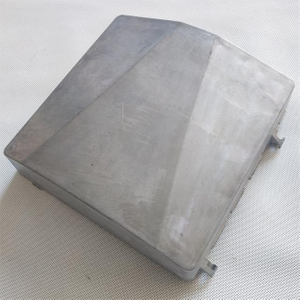Ever wondered how those stunning textured metal surfaces in modern buildings are created? Embossed metal sheets represent one of the most versatile innovations in architectural and industrial materials. These engineered surfaces combine aesthetic appeal with enhanced functionality, offering up to 40% greater strength than standard metal sheets while providing superior slip resistance and visual interest.
From sleek building facades to industrial flooring, embossed metal sheets have revolutionized how we approach both form and function in construction. This comprehensive guide explores everything you need to know about these remarkable materials – their types, benefits, applications, and manufacturing process.
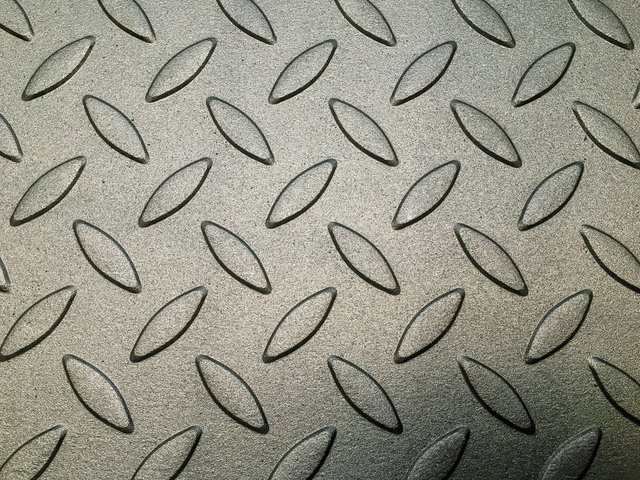
What Are Embossed Metal Sheets?
Metal embossing transforms plain metal surfaces into patterned sheets through pressure-based techniques. It creates raised or depressed designs enhancing both functionality and aesthetics.
Core Process:
Historical Evolution:
Originally a manual craft centuries ago, metal embossing evolved from hand-hammered decorative pieces to modern industrial processes. Technology advancement brought precision and mass production capabilities.
Key Differences vs Regular Sheets:
| Feature | Regular Sheets | Embossed Sheets |
| Surface | Flat | Textured |
| Strength | Standard | Enhanced |
| Grip | Basic | Anti-slip |
| Uses | General | Specialized |
Modern Applications:
️ Construction materials
Automotive components
Industrial equipment
Architectural elements
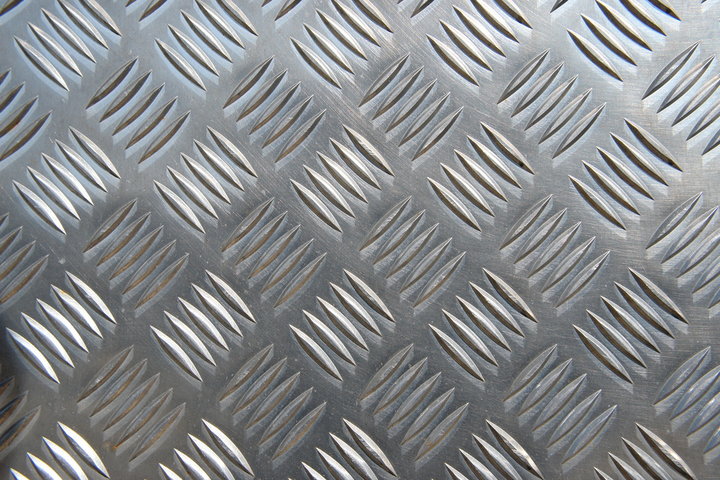
Benefits of Using Embossed Metal Sheets
Structural Enhancement:
Metal embossing transforms plain sheets into stronger surfaces through strategic pattern placement. The patterns act like tiny support beams, distributing weight and pressure across the entire surface. This modification increases the material's load-bearing capacity by up to 30%, creating:
Deformation resistance
Impact absorption
Stress distribution
Wear reduction
Durability Boost:
Embossed patterns create a protective layer against everyday wear. The raised textures absorb impacts, prevent surface damage, and extend product life. Most embossed sheets last 40% longer than plain counterparts, ensuring:
Superior impact resistance
Better load distribution
Enhanced stress handling
Reduced wear patterns
Visual Impact:
Embossing adds dimensionality to flat metal surfaces. The process creates eye-catching patterns, ranging from subtle textures to bold designs. These patterns reflect light differently, adding depth and character through:
Safety Features:
The textured surface dramatically improves grip and traction. This enhancement reduces slip accidents by up to 60% compared to smooth surfaces, providing:
Non-slip performance
Grip enhancement in wet conditions
Traffic safety improvements
Accident prevention capabilities
Cost Efficiency:
While initial costs run 15-20% higher than plain sheets, embossed metals offer superior value:
| Feature | Benefit | Improvement |
| Initial Investment | Higher quality | Better ROI |
| Maintenance Cost | Minimal upkeep | -40% |
| Replacement Rate | Reduced frequency | -50% |
| Product Lifespan | Extended durability | +40% |
Environmental Impact:
Embossed sheets support sustainability through:
100% recyclable materials
40% longer service life
Reduced replacement waste
Lower resource consumption
Maintenance Ease:
Textured surfaces hide minor scratches and dents. They require only basic cleaning and minimal repairs, cutting maintenance time by half through:
Performance Quality:
These sheets maintain their properties under various conditions:
Weather resistant up to 20 years
Temperature tolerance: -40°F to 180°F
Chemical resistance to common substances
Impact resistance: 30% higher than standard sheets
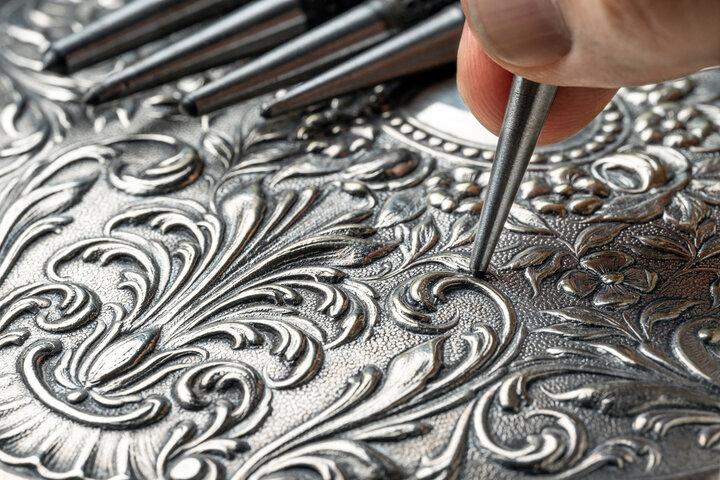
Popular Types of Embossed Metal Sheets
Stucco Embossed Metal Sheets
Surface Pattern: Stucco embossing creates a distinctive orange-peel texture on metal surfaces. This unique pattern mimics traditional stucco finishes, providing both aesthetic appeal and functional benefits.
Core Features:
Uniform texture distribution
Light-diffusing properties
Scratch concealment ability
Fingerprint resistance
Application Range:
Building exteriors: Cladding, roofing
Appliance panels: Refrigerators, dishwashers
Industrial equipment: Machine covers, panels
Interior walls: High-traffic areas
Cost Analysis:
| Factor | Impact |
| Material Cost | Mid-range |
| Installation | Standard |
| Maintenance | Low |
| Lifespan | 15-20 years |
Diamond Plate Embossed Sheets
Pattern Design: Diamond plate features raised diamond patterns across the surface. These geometric shapes create a distinctive industrial look while providing crucial safety benefits.
Safety Characteristics:
Slip resistance rating: R12-R13
Load bearing capacity: +40%
Impact resistance: High
Traction enhancement: 60%
Industrial Applications:
Loading docks
Industrial flooring
Vehicle ramps
Stair treads
Installation Requirements:
Proper substrate preparation
Correct fastener spacing
Edge treatment
Expansion allowance
Leather Grain Embossed Sheets
Aesthetic Design: Leather grain embossing replicates natural leather textures on metal surfaces. This premium finish combines industrial durability with luxury appearance.
Design Applications:
Executive offices
High-end retail spaces
Luxury elevators
Designer furniture
Durability Specs:
Wear resistance: Excellent
UV stability: 10+ years
Chemical resistance: Moderate
Impact tolerance: Medium-high
Maintenance Protocol:
Regular dusting
Mild cleaner use
Annual inspection
Touch-up as needed
Each type serves specific purposes combining functional requirements with aesthetic preferences. Property owners should consider their specific needs when selecting the appropriate pattern.
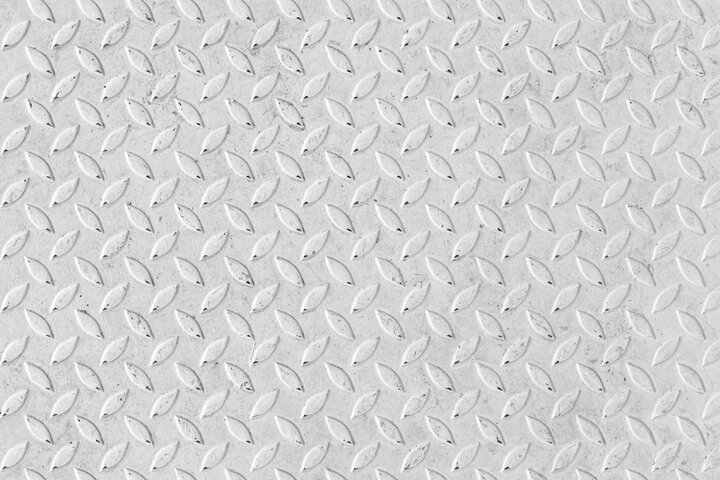
Manufacturing Processes for Embossed Metal Sheets
Roller Embossing Technique
Process Mechanism: Roller embossing employs continuous rotation of patterned cylinders. Metal sheets pass between these rollers under precise pressure, creating consistent patterns across long surfaces.
Equipment Components:
Patterned roller pairs
Pressure control system
Feed mechanism
Collection system
Performance Metrics:
| Feature | Specification |
| Production Speed | Up to 50m/min |
| Pattern Depth | 0.1-2.0mm |
| Sheet Width | Up to 2000mm |
| Material Thickness | 0.3-3.0mm |
Application Strengths:
Large-scale production
Continuous operation
Pattern consistency
Cost efficiency
Stamping Press Embossing
Operating Principle: Stamping press uses matched die sets. High pressure creates detailed patterns through direct force application.
Optimal Usage:
Complex patterns
Deep impressions
Small batch production
Precision requirements
Technical Benefits:
Quality Assurance:
Pattern depth monitoring
Surface inspection
Dimensional checking
Material stress testing
Hydraulic Embossing Process
Technical Operation: Hydraulic systems generate controlled pressure through fluid dynamics. This method enables precise force distribution across complex patterns.
Control Features:
Pressure range: 100-500 tons
Digital control interface
Real-time monitoring
Adjustable speed settings
Design Capabilities:
Multi-level patterns
Custom designs
Variable depths
Complex geometries
Cost Structure:
| Element | Impact Level |
| Equipment | High initial |
| Operation | Moderate |
| Maintenance | Low |
| Per-piece | Variable |
Production Parameters:
Cycle time: 15-45 seconds
Pattern accuracy: ±0.05mm
Size capacity: Up to 3000mm
Material range: Extensive
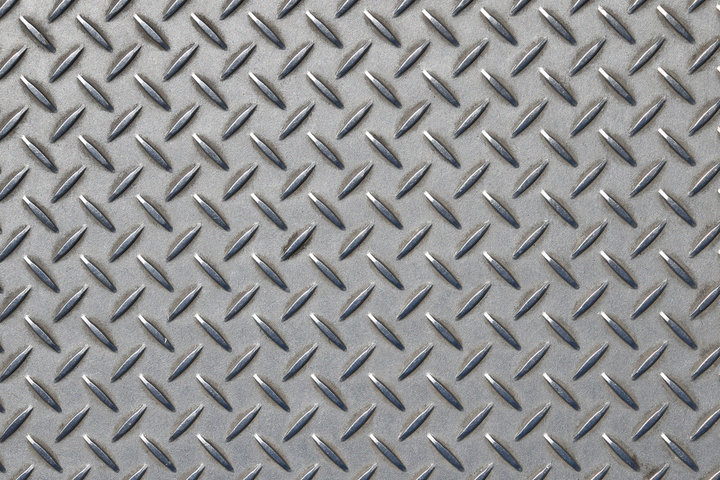
Materials Used in Metal Sheet Embossing
Aluminum Embossed Sheets
Material Properties: Aluminum offers exceptional lightness and corrosion resistance. Its density stands at 2.7 g/cm³, making it 70% lighter than steel while maintaining structural integrity.
Physical Characteristics:
Weight: Ultra-light
Strength-to-weight ratio: 3:1
Corrosion resistance: Excellent
Temperature range: -80°C to 300°C
Application Range:
Building facades
Interior panels
Ceiling systems
Transportation equipment
Cost-Benefit Analysis:
| Factor | Rating | Details |
| Initial Cost | Medium | $3-5/sq ft |
| Installation | Low | Easy handling |
| Maintenance | Minimal | Self-protecting oxide layer |
| Lifespan | 20+ years | Weather resistant |
Stainless Steel Embossed Sheets
Strength Metrics: Stainless steel delivers superior strength properties. Its tensile strength reaches 515-827 MPa, offering exceptional durability.
Resistance Properties:
Corrosion protection: Superior
Chemical resistance: High
Heat tolerance: Up to 800°C
Impact resistance: Excellent
Common Applications:
Market Positioning:
Premium grade: $8-12/sq ft
Commercial grade: $6-8/sq ft
Industrial grade: $5-7/sq ft
Custom specs: Variable
Brass and Copper Embossed Sheets
Aesthetic Features: These materials offer rich, warm metallic tones. They develop distinctive patinas over time, enhancing visual appeal.
Workability Factors:
Forming ease: Excellent
Pattern definition: Sharp
Detail retention: High
Surface finishing: Various options
Application Specifics:
Architectural accents
Decorative panels
Heritage restoration
Luxury interiors
Maintenance Protocol:
| Task | Frequency | Purpose |
| Cleaning | Monthly | Preserve shine |
| Polishing | Quarterly | Maintain luster |
| Protective coating | Yearly | Prevent oxidation |
| Inspection | Semi-annual | Check patina development |
Performance Metrics:
Tensile strength: 200-400 MPa
Thermal conductivity: High
Oxidation rate: Moderate
Pattern retention: Long-term
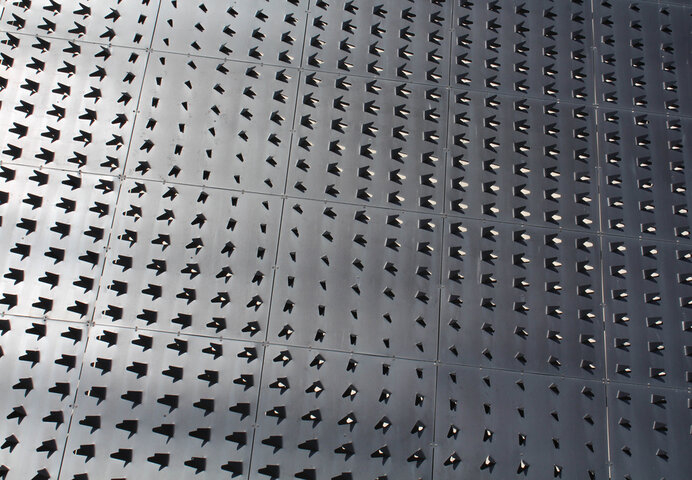
Applications of Embossed Metal Sheets
Architectural Applications
Building Facades: Embossed metal sheets transform exterior surfaces. These panels create dynamic visual effects through light reflection, adding depth to building designs while providing weather protection.
Interior Elements:
Wall cladding: Sound absorption, +30% noise reduction
Ceiling panels: Light diffusion, enhanced acoustics
Column covers: Impact resistance, decorative finish
Partition walls: Space division, aesthetic appeal
Application Performance:
| Feature | Benefit | Impact |
| Durability | 20+ years lifespan | Long-term value |
| Weather Resistance | All-climate suitable | Reduced maintenance |
| Installation | Modular system | Fast assembly |
| Aesthetics | Custom patterns | Design flexibility |
Industrial Uses
Safety Solutions: Industrial applications prioritize functionality. Embossed patterns provide crucial safety features in demanding environments.
Key Applications:
Platform flooring: 60% slip reduction
Equipment enclosures: IP65 protection rating
Machine guards: Impact resistance up to 50 joules
Storage systems: Load capacity 500kg/m²
Technical Specifications:
Grip pattern depth: 0.5-2.0mm
Load bearing: Enhanced by 40%
Temperature tolerance: -40°C to +120°C
Chemical resistance: Industrial grade
Commercial Settings
Retail Environments: Commercial spaces benefit from versatile applications. Embossed metals combine practicality with modern aesthetics.
Design Applications:• Display Systems
Load capacity: 100kg/m²
Customizable patterns
Modular design
Easy installation
• Interior Solutions
Sound rating: NRC 0.75
Fire rating: Class A
Light reflection: 65%
Maintenance: Minimal
Functional Features:
Anti-vandal properties
Easy cleaning protocols
Modular replacement
Design flexibility
Installation Metrics:
| Application | Installation Time | Maintenance Cycle |
| Wall Panels | 2-3 days/100m² | Annual |
| Flooring | 1-2 days/100m² | Semi-annual |
| Furniture | Custom | Quarterly |
| Signage | 1 day/unit | Monthly |
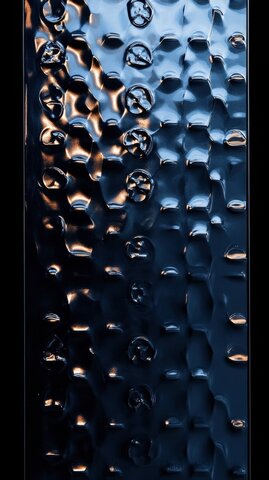
How to Choose the Right Embossed Metal Sheet
Purpose Assessment: Start by identifying your primary application needs. Consider load-bearing requirements, traffic intensity, and aesthetic goals. Industrial applications need focus on durability, handling loads up to 500kg/m². Decorative uses prioritize pattern consistency and visual appeal.
Pattern Selection:
Anti-slip needs: R9-R13 ratings available
Light reflection: 20-65% range
Sound control: NRC 0.15-0.75
Visual impact: Pattern depth 0.1-2.0mm
Environment Analysis: Evaluate the installation environment carefully. Temperature fluctuations, humidity levels, and chemical exposure significantly impact material choice. Consider:
| Environmental Factor | Impact on Selection |
| Temperature Range | -40°C to +120°C |
| Humidity Exposure | 0-100% RH |
| Chemical Contact | pH 2-13 resistance |
| UV Exposure | Rating needed |
Budget Planning: Calculate total ownership costs, not just purchase price:
Initial Investment
Installation Costs
Labor: $2-5/sq ft
Tools and equipment
Mounting systems
Installation Requirements: Understanding installation needs prevents future problems:
Maintenance Planning: Factor in long-term care requirements:
Quality Verification: Check essential specifications:
Material certification
Pattern consistency
Thickness tolerance
Surface finish quality
Installation Guide for Embossed Metal Sheets
Pre-Installation Requirements: Successful installation begins well before the first sheet goes up. The key lies in thorough preparation. Metal sheets must acclimate to room temperature for 24 hours before installation to prevent thermal expansion issues.
Surface Preparation: A properly prepared surface directly impacts installation quality and longevity.
Clean substrate: Remove all debris, oil, and rust. Even minor contaminants can compromise adhesion
Level surface: Ensure maximum deviation stays within 2mm/m. Uneven surfaces lead to visible distortions
Temperature control: Maintain 15-25°C during installation. Temperature affects metal expansion
Humidity management: Keep below 60% to prevent moisture-related issues
Essential Tools: Professional installation demands the right equipment. Each tool serves a specific purpose:
| Basic Tools | Purpose | Safety Equipment | Measuring Devices |
| Metal shears | Clean cuts | Safety glasses | Laser level |
| Power drill | Fastener holes | Cut-resistant gloves | Digital tape measure |
| Impact driver | Secure mounting | Steel-toe boots | Professional square |
| Level | Alignment check | Respirator | Marking tools |
Installation Process:
Layout Planning: Proper planning prevents costly mistakes and ensures aesthetic appeal.
Measure installation area twice for accuracy
Calculate sheet placement to minimize waste
Mark clear reference lines every 1 meter
Plan expansion gaps: 3-5mm prevents buckling
Sheet Preparation: Careful handling preserves sheet quality.
Verify dimensions against plan specifications
Cut sheets using appropriate tools for clean edges
Clean surfaces with manufacturer-approved products
Apply protective coating when specified
Mounting Sequence: Follow a systematic approach for best results.
Begin from room corners or designated starting points
Use laser level for perfect alignment
Install fasteners according to load requirements
Check pattern matching between sheets
Common Mistakes Prevention:
Incorrect spacing leads to pattern misalignment
Use manufactured spacer guides
Create installation templates for consistent results
Double-check measurements before securing
Over-tightening damages sheet integrity
Follow torque specifications exactly
Use calibrated tools for consistent pressure
Check each fastener during installation
Poor surface preparation causes long-term failures
Complete thorough surface assessment
Document preparation steps
Verify conditions before proceeding
Safety Protocol:
Personal Protection: Safety equipment isn't optional.
Impact-resistant eye protection prevents metal debris injuries
Cut-resistant gloves rated for metal handling
Steel-toe boots protect against dropping sheets
Proper respiratory protection during cutting operations
Work Area Safety: Create a secure installation environment.
Ensure proper ventilation for dust control
Use OSHA-approved work platforms
Maintain clear walkways
Keep first aid supplies accessible
Quality Checks:
Verify pattern alignment every 3-4 sheets
Test each fastener for proper seating
Inspect surface cleanliness before finishing
Check edge finishing for safety
Document final installation appearance
Remember: Professional installation might cost more initially but prevents expensive repairs and replacements later. Each step in this process contributes to a successful, long-lasting installation that meets both functional and aesthetic requirements.
Conclusion
Embossed metal sheets have undergone remarkable transformation since their inception. From humble beginnings as decorative elements, they've evolved into sophisticated solutions meeting diverse industrial, architectural, and commercial needs. Their ability to combine aesthetic appeal with functional benefits has established them as indispensable materials in modern construction and design.
The future of embossed metal sheets looks bright, offering enhanced solutions for tomorrow's challenges. Make informed decisions today by connecting with industry experts who can guide your project toward success. Your next innovative solution might just begin with embossed metal sheets.
Reference Sources
Sheet metal embossing
Sheet metal
Metal


















